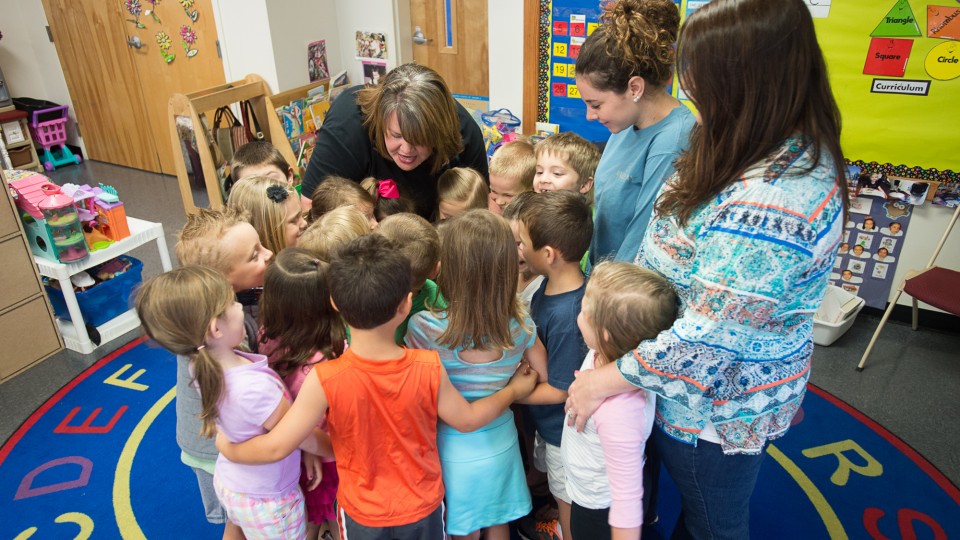Early childhood education teacher pay doesn't add up
- June 21, 2016
- / Reggie Dogan
- / education

We’ve come to understand that it pays to have high-quality early childhood education.
It is especially critical to closing the achievement gap between children of different economic backgrounds and for preparing them for kindergarten, primary school and beyond.
But when it comes to paying the educators who teach the children, the numbers don’t quite add up.
The U.S. Department of Education ad Health Services co-released a report that identifies striking gaps between the pay offered to kindergarten teachers vs. those who teach preschool or early childhood education.
The Atlantic magazine’s headline made the discrepancy in pay strikingly clear: “Preschool Teachers Earn Less Than Tree Trimmers.”
The expansion of preschool is one of the few topics where both Republicans and Democrats in Congress find common ground; while lawmakers don’t always agree on how programs should be funded or structured, the belief that good early-childhood education can help prevent later gaps in test scores and graduation rates from emerging between poor and well-off children is widely shared. Yet most early-childhood educators still make so little money that they are eligible for public benefits, according to a new report from the U.S. Education Department and Health and Human Services. Childcare workers, nearly all of them women, earn less than tree trimmers and pest-control workers, hairdressers and janitors.
At a time when a great focus of local, state and national attention on early education, it is discouraging — and counter-productive — to have such large pay gaps among educators who are charged with teaching our children.
Research shows that children who have quality opportunities to learn in early years not only do better in school, but are more likely to have successful careers later, and even be healthier as they age.
Among the goals of the Studer Community Institute is to improve the community’s quality of life, and one of the key 16 metrics included in the Pensacola Metro Dashboard is kindergarten readiness.
More and more research points to the critical importance of early education in a child’s life. But data from the Florida Office of Early Learning shows that too many children in the Pensacola metro aren’t getting the benefits.
In the 2013-2014 school year, only 66 percent of Escambia kindergartners were ready for school based on their performance on state measurements.
To ensure that all children are ready for kindergarten, education experts maintain that access to affordable, high-quality education that promotes early learning and school readiness is essential.
A major component of having a quality child-care program is the teachers, and if you don’t offer a lucrative or fair salary for them, then you won’t always get the best teachers.
While research and science say that early learning is critical, teacher pay suggests something completely different.
The median hourly wage is $9.77 nationwide for childcare workers, which equates to $20,320 annually. Preschool teachers earn $13.73 hourly, or $28,570 a year, and kindergarten teachers make $25.31 an hour, which is $52,650 a year.
Phyllis Pooley, who works for the Office of Economic Development and Engagement at the University of West Florida, says the median hourly wage in the Pensacola metro area is $9.27 for childcare workers, which comes to $19,281 a year, according to the Florida Department of Economic Opportunity. The state media wage is $9.55, or $19,864 a year.
Our education system has created a conflict between early childhood “daycare” and education, viewing time spent with children ages 1 through 5 as simply babysitting, but time spent in kindergarten and beyond as education.
Too often we child care as a task anyone, especially women, can take on, one that does not require special education, training or skill. As a result the belief is that it does not require higher wages. But early childhood educators with degrees in early childhood development create higher-quality programs and greater student achievement.
So how do we promote a better-trained workforce when pay is so low, funding so limited and general respect for industry so lackluster?
“It’s a real problem,: said Allison Friedman-Krauss, an assistant research professor at the National Institute for Early Education Research.
But Marcy Whitebook, the director of the Center for the Study of Child Care Employment at the University of California at Berkeley, who has been studying early childhood for four decades, thinks that increasing pay would go a long way toward improving the quality of the care and education young children receive.
“If you changed the pay, you’d have the people,” Whitebook said.
Given the attention on early education, now is the time to talk about better wages for teachers, Whitebook proposed:
More people are at the very least concerned about early childhood education. Now, the trick is to transform that concern into policies that promote early childhood as a career path that is more than a ticket to poverty.
 CivicCon launches with a look at good growth in cities
CivicCon launches with a look at good growth in cities
 Building stronger brains one baby, one parent at a time
Building stronger brains one baby, one parent at a time
 SCI debuts commercial on Early Learning City
SCI debuts commercial on Early Learning City
 Entrecon: World class speakers and an opportunity to sharpen skills
Entrecon: World class speakers and an opportunity to sharpen skills
 PYP Quality of Life survey 2017
PYP Quality of Life survey 2017
 EntreCon Pensacola 2016: A look back
EntreCon Pensacola 2016: A look back
 Leadership tip: getting better employee takeaways
Leadership tip: getting better employee takeaways
 Leadership tip: be interested instead of interesting
Leadership tip: be interested instead of interesting
 Leadership tip: delivering difficult messages
Leadership tip: delivering difficult messages
 Brain Bags boost Arc, Early Childhood Court programs
Brain Bags boost Arc, Early Childhood Court programs